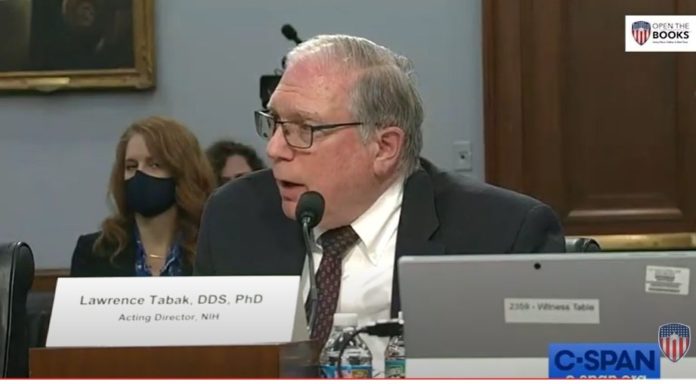The new head of the NIH either lied about the entity’s conflicts of interest or he doesn’t know what he is talking about. Neither are good.
Yesterday we reported on the Open The Books report on the millions of dollars paid to US workers and scientists at the government’s National Institutes of Health (NIH).
This information made it to the US House where Representative John Moolenaar (R-MI) used the information in the report to address members of the NIH. In talking to NIH Acting Director Lawrence Talbot, Rep. Moolenaar asked some pointed questions about the ‘real’ conflicts of interest within this organization of the US government where Dr. Fauci has housed himself for years.
Moolenaar shared:
If the agency is awarding who the beneficiary of the grant who’s doing the trial and there are somehow finances involved, that there’s a financial benefit that could be accrued if someone’s patent or invention is considered valid, do you not see that as a conflict or an appearance of a conflict of information [interest]?
Dr. Talbot responded:
I fully understand how it might sound as an appearance but, and it’s the sort of thing that we could maybe work together on so that we could explain to you the firewalls that we do have in place. Because they are significant and substantial.
See the video below starting at the 4:46 mark:
The problem with this discussion is the lack of understanding of what is a conflict of interest. It is great that the Rep from Michigan is asking the question but clearly individuals who have a financial interest in a decision to select a certain drug for use across the country, have a real or actual conflict of interest. These are not perceived, they are real.
Here are some definitions of types of conflicts of interest:
For example, you could be running a tender process for your agency when you are surprised to discover that one of the bidders is your cousin. This is an actual conflict of interest; you are confronted with a dilemma. You are in conflict between two social values – your professional duty to be objective and your duty to family.
A potential conflict of interest is one that is not actual but, in time, could be. Let’s say you work in the IT section of an agency and your brother opens a computer store in the area. You have no tenders out now for IT equipment but it is possible you will hold one in the future which your brother might want to bid for.
A perceived conflict is trickier. In these situations there may be no actual or potential conflict, but someone could think (reasonably, of course) there is one and this can have its own ramifications.
The Democrats and their government are full of conflicts of interest. But to them, it doesn’t matter. It’s all about the money and the end game.
These doctors should not be paid for a drug or medicine picked by the NIH when they have any type of conflict of interest. Period.



